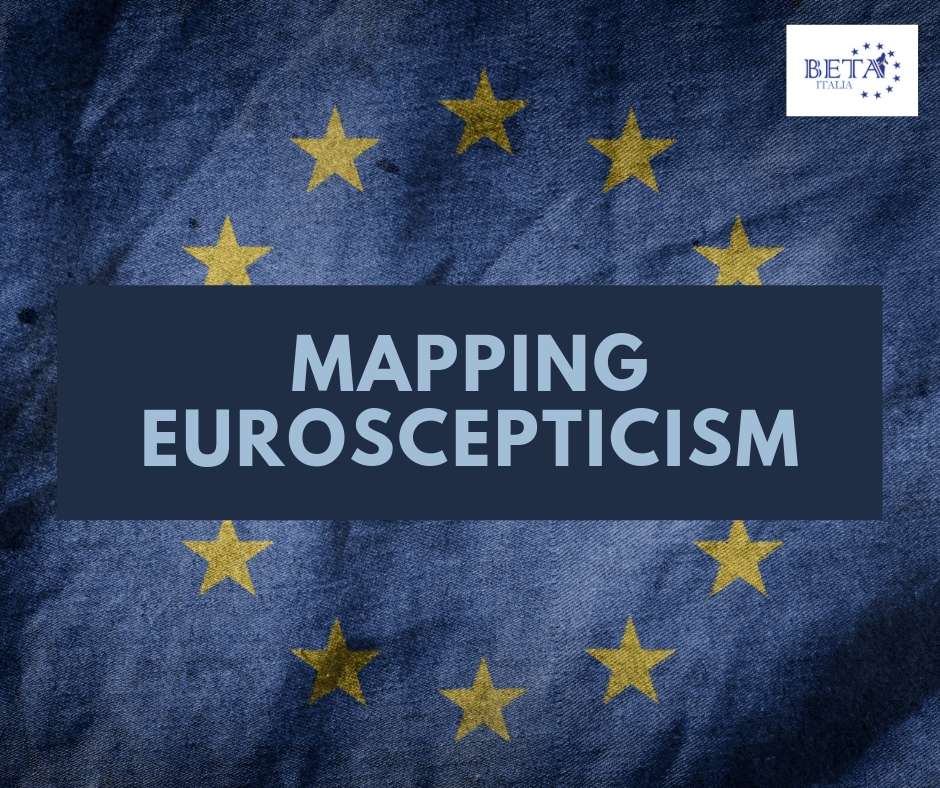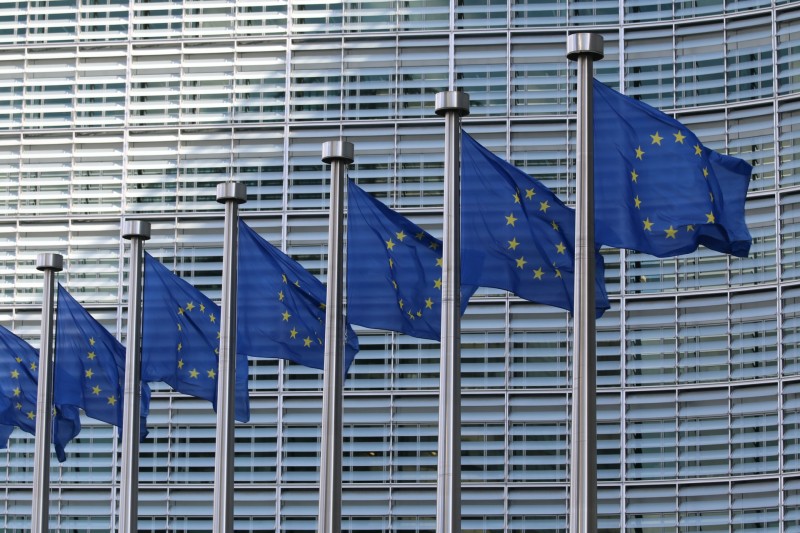Map of the main Eurosceptic parties in Europe
A wave of Euroscepticism has spread throughout the European continent. Throughout the last five years, old and new Eurosceptic forces have been growing and consolidating to such an extent that will constitute a block that, despite its polarization, will involve a large number of EU member countries.

What are the main Eurosceptic parties in Europe? Can we detect a difference? We will analyse the 12 main Eurosceptic political parties in Europe.
FRANCE. National Front (now National Rally) - leader, Marine Le Pen. Founded on political ideals such as protectionist conservatism and right-wing populism, the National Front (FN) is an anti-EU and anti-migrant movement that is arising in national and European polls. Its leader, Marine Le Pen, declared that French citizenship should be “inherited or deserved”. Moreover, the party is against the free movement provided by the Schengen Area. Before the French presidential elections in 2017, Marine Le Pen promised to hold a referendum on a possible Frexit to exit the monetary union and build up a “Europe of sovereign nations”. The National Front lost the presidential elections to Macron, and is currently still part of the MEP group called Europe of Nations and Freedoms (ENF).
GERMANY. Alternative for Germany - leaders, Jörg Meuthen and Alexander Gauland. We are talking about the main German Eurosceptic party based on nationalist conservatism and ultra-right nationalism. The party was founded in 2013 as an anti-euro movement. Since 2015, the party has focused its attention on campaigns against mass immigration and the “Islamization of the West”, adopting xenophobic policies. The leaders pledged to get Germany out of the EU and reintroduce border controls. It is part of the MEP Group Europe of Freedom and Direct Democracy with UKIP and the 5 Star Movement.
ITALY. The last political elections of March 2018 birthed the so-called “yellow-green government” or “government of change”, formed thanks to the political alliance between the 5 Star Movement and the Northern League. Currently, these parties are the two main political forces of the country and are notoriously known for their very critical positions of the European integration project. Despite their Eurosceptic nature, Northern League and 5 Star Movement have a different political conception of “Europe”.
5 Star Movement - leader, Luigi Di Maio. The M5S has often and firmly conducted campaigns against the euro, as well as against the Fiscal Pact and the powers of the ECB. Moreover, it has repeatedly proposed to held a “consultative referendum” on the euro. Direct democracy is the core of the movement – candidates and policies are chosen even through an online voting system called “Rousseau”. The party is based on elements of populism and anti-systemic, without a clear political identity. Nonetheless, the M5S has its “reformist” vision of the European integration project. The Movement wants a revision of the European economic and political system, with a radical change of the austerity policies. Currently, the M5S is part of the same MEP group with Nigel Farage, the main promoter of Brexit. Luigi Di Maio announced the names of the five allies in Europe: a formal alliance with the anti-crime party “Zivi Zid” (Croatia), with “Kukiz 15” from Poland, with “Liike Nyt” from Finland and “Akkel” from Greece. We are talking about with parties of right-wing populist and “sovereign” inspiration.
Northern League - leader, Matteo Salvini. Based on elements of regionalism, federalism, anti-globalism and extreme-right national-populism, the Northern League can be considered as the main Eurosceptic force in Italy and one of the biggest in Europe. The party has repeatedly declared to be against the single currency and expect a return to the Italian lira. It promotes an anti-immigration policy, especially towards the migratory movements of the Mediterranean Sea. Its political positions are at odds with the supranational role of the EU institutions. According to Salvini, “the euro is not a dogma”. Indeed, in view of the 2019 European elections, the objective is to build a strong MEP group to request the revision of European treaties, as “the national interest should be the priority under the European law”. Salvini hopes to plan an euro exit together with the other EU member states and, in case of a negative response, exit the monetary union unilaterally through a special “Plan B”. With the slogan “Italians first”, the party has grown considerably in the Italian political polls, reaching almost the 32% of the electoral support, at the expense of the current 22% for the M5S. Currently, it is a member of the MEP group Europe of Nations and Liberties with Marine Le Pen and is seeking an agreement with Eastern European countries (especially with Hungary and Poland).
HUNGARY. FIDESZ Hungarian Civic Alliance - leader Viktor Orbán. It is a party founded on nationalist conservatism, right-wing populism and “soft Euroscepticism”. The vote of the European Parliament in favour of sanctions against Hungary is absolutely relevant. MEPs have asked to apply Article 7 of the EU treaties with 448 votes. Indeed, the latter provides the necessary measures to sanction EU countries which violate the values of EU. The article includes the loss of the right to vote within the Council of the EU.
This is the first time in European history that the European Parliament intends to apply this article against one of the EU member states. The Hungarian government has been accused of having acted against the EU’s core values, among which it is possible to mention “the refusal of the Hungarian Government to assist refugees according to international law, actions aimed at limiting freedom of speech and press and measures against NGOs”. Orban has been accused of having facilitated the emergence of a form of authoritarianism at odds with the principle of representative democracy of the EU. It should be noted that the Orban party is still part of the European People’s Party, along with politicians such as Angela Merkel and Silvio Berlusconi. We are talking of one of the most pro-European parties, as well as on of the largest in terms of parliamentary seats.
The European People’s Party has recently decided to suspend the membership of Fidesz to the European popular family. Indeed, “the party will not be able to participate actively, nor will have the right to vote and to propose candidates.” Nonetheless, it seems that Orban does not want to leave the EPP. Should Orban leave the popular group, this might lead to a new parliamentary political alliance, a strategy already adopted by other leaders such as Salvini and Nigel Farage.
SWEDEN. Swedish Democrats - leader, Jimmie Åkesson. In the general elections of Sweden in 2018, the party obtained the third place with 17.6% of the votes. The party is based on a form of social conservatism and right-wing populism. It is part of the European Conservatives and Reformists Group in the European Parliament.
AUSTRIA. Austrian Freedom Party - leader, Heinz-Christian Strache. Currently, it is the third Austrian political force and shows a conservative and nationalist ideology. Its leader Heinz-Christian has carried out a campaign against the “Islamization of Europe” and supports a total ban on the use of burka. The party, which used the slogan “Austria first”, has also called for stricter border controls and a reduction of immigration movements. It is part of the same MEP group where it is located the French National Rally.
NETHERLANDS. Party for Freedom - leader, Geert Wilders. A controversial party, founded on values such as nationalism, Islamophobia and right-wing populism. Its leader Wilders is considered one of the most prominent and influential Eurosceptic political figures at European level. In 2005, the Party carried out the electoral campaign against the approval of the European Constitution. It is part of the MEP group Europe of Nations and Freedom.
DENMARK. Danish People’s Party - leader, Peter Skaarup. It is a movement that has grown substantially in recent years, mainly basing its campaign on anti-immigration issues. Founded on social conservatism and in line with other parties at European level, the party aims at holding a referendum on leaving the EU, taking as a model the British vote on Brexit of June 2016. In the European Parliament, it is part of the European Conservatives and Reformists Group.
FINLAND. True Finns - leader, Timo Soini. The party is marked by an ideology based on social conservatism and economic nationalism. At the core of its political vision, the European Union is seen as the pinnacle of unbridled capitalism. In line with other European parties, it has repeatedly attempted to hold a referendum to leave the EU. The party is part of the Alliance of European Conservatives and Reformists.
GREECE. The Golden Dawn - leader, Nikolaos Michaloliakos. This party has grown in popularity as Greece went through a severe economic crisis, obtaining 7% of the votes in the general elections of 2015. The party has been described as neo-Nazi political force, although it has often rejected this political target. As known, a party spokesman appeared on television with a swastika-shaped tattoo, ending in trial. It is part of the extreme right-wing European party called Alliance for Peace and Freedom.
POLAND. Law and Justice - leader, Jarosław Aleksander Kaczyński. We are talking about a political party mainly based on the following political ideals: moderate Euroscepticism, Christian Democracy, Nationalist Conservatism and political Catholicism. Currently the party is governing the country thanks to the national elections of 2015 with 39% of votes and 242 deputies out of a total of 460. Its leader aimed at re-establishing capital punishment, as well as at opposing “euthanasia, gay marriage and the legalization of drugs”. As pointed out by El País, the relationship of the party and Poland with Europe is ambivalent since, “although its citizens appreciate the economic and strategic security provided by the Union, the most vulnerable part of civil society – especially elderly, rural and impoverished people – fears that his Catholic identity will dissolve within the secular modernity marked by Europe”. In addition, the party has been conducting an election campaign based on anti-European rhetoric for years, “presenting Poland as a country of Roman Catholic tradition” and challenging the democratic values of the Union. The party is a member of the European Conservatives and Reformists.
What could be the key-issues for the upcoming 2019 European elections?
In light of the above, there are two possible issues that the European Eurosceptic parties could use as a workhorse to build a strong and effective parliamentary group in the European Parliament: 1) immigration and 2) the supranational role of the European Union (above all, with reference to fiscal policies, the parameters of Maastricht, the powers of the ECB and budgetary expenditures within the member states of the EU).
It is difficult to find a single common electoral block, since some parties defining themselves as Eurosceptics have a “reformist” and not necessarily “destructive” vision of Europe – a strategy aimed at giving more powers to nations. Accordingly, one clear example is the case of the 5 Star Movement which, despite sharing Eurosceptic positions, expects an institutional change at the European level.
Concretely speaking, at 47 days before European elections, the most ambitious project has been presented by Matteo Salvini. At a recent conference in Milan, the leader of the Northern League has presented the “European Alliance of People and Nations” whose objective is to create an “enlarged” European parliamentary group. As the newspaper Il Post reported, “the new formation […] will start from the European group ENF, which currently includes the majority of the parties of the radical European right (including the Northern League and Marine Le Pen), but aims to make new allies.” Indeed, among the most important parties which accepted Salvini’s invitation it is possible to mention Alternative for Germany, as well as the Danish People’s Party and the True Finns. During the conference there was no member of Law and Justice or Victor Orban’s Fidesz. Effectively, we are mentioning political forces that Salvini has been courting for some time and without which it will be difficult to forge a coalition capable of counteracting the probable alliance between PSE, PPE, the Greens and ALDE; a very difficult challenge, but not impossible.
Should we not forget that Italy is one of the founding countries of the EEC, the EU and the European integration project, as well as the third economic power of the EU. We are about to face a historical turning point in which the absence of a trilateral axis between Germany, Italy, and France could be decisive both in the European Parliament and in the Council of the EU and the European Council, for the EU legislative process and the definition of a common political agenda.
Bibliography:
• Albert Aixalà i Blanch, Crisis económica y Euroescepticismo (2007-2014), http://www.fundacionalternativas.org/public/storage/estudios_document os_archivos/c2452f69087858fe49a92223e84b0408.pdf.
• Bernardo de Miguel, Orbán desafía a la UE y provoca una grave escisión en el grupo Popular, https://elpais.com/internacional/2018/09/11/actualidad/1536667488_238591.html.
• Carlos Yarnoz, Los movimientos sustituyen a los partidos, https://elpais.com/internacional/2018/04/23/actualidad/1524488046_446440.html.
• Daniel Dal Zennaro, L’alleanza dei sovranisti per le europee, Il Post, https://www.ilpost.it/2019/04/08/salvini-alleanza-sovranista-europa/.
• Enea Desideri, Eurosceptic or Europhile? Shedding light on the Five Star Movement’s stance towards the EU, https://openeurope.org.uk/today/blog/eurosceptic-or-europhile-shedding-light-on-the-five-star-movements-stance-towards-the-eu/.
• Giulia Giacobini, Chi sono gli alleati del Movimento 5 stelle alle elezioni europee? Wired, https://bit.ly/2FC4TKy
• Joe Barnes, Brussels Correspondent, On May 26 2019 the EU as we know it will CEASE TO EXIST if populist revolt succeeds, https://www.express.co.uk/news/world/1002706/EU-news-European-Union-Parliament-election-2019-populist-revolt.
• Joe Barnes, Euroscepticism MAPPED: Five countries threatening to ROCK the EU, https://www.express.co.uk/news/world/941976/EU-news-five-eurosceptic-countries-threaten-European-Union.
• Jonathan Stearns and Viktoria Dendrinou, Populists Keep EU on Edge as Focus Shifts to 2019 Elections, https://www.bloomberg.com/news/articles/2018-08-12/populists-keep-eu-on-edge-as-focus-shifts-to-2019-elections.
• Juan Sanhermelando, La UE se pone de perfil ante el auge de los partidos euroescépticos en Italia, https://www.elespanol.com/mundo/europa/20180305/ue-pone-perfil-auge-partidos-euroescepticos-italia/289721630_0.html.
• Laura Arago, Carles Villalonga, Así ha ganado terreno el euroescepticismo en cada uno de los países de la UE, https://www.lavanguardia.com/internacional/20180429/443054697567/euroescepticismo-union-europea.html.
• LAVANGUARDIA, Internacional, El Parlamento Europeo vota a favor de sancionar a Hungría por incumplir las reglas democráticas, https://www.lavanguardia.com/internacional/20180912/451777474396/parlamento-europeo-vota-favor-sencionar-hungria-viktor-orban.html.
• Luis Bouza, Populismo, extremismo y euroescepticismo, https://www.elperiodico.com/es/opinion/20170415/populismo-extremismo-y-euro-escepticismo-diferencias-conceptuales-y-practicas-5969695.
• María Victoria Álvarez, El euroescepticismo en el Parlamento europeo. Análisis del comportamiento legislativo y político de los diputados euroescépticos de la Cuarta a la Séptima legislaturas (1994-2014). ¿Cambio o continuidad en la Octava legislatura 1 (2014-2019)?, http://ced.revistas.deusto.es/article/viewFile/797/930.
• María Victoria Álvarez, El euroescepticismo en una Unión Europea en crisis: ¿viejo fenómeno en nuevos odres?, https://rephip.unr.edu.ar/bitstream/handle/2133/5684/Articulo%201%20%20Revista%20Nro.%2013.pdf?sequence=3&isAllowed=y.
• Mark Leonard and José Ignacio Torreblanca, The Eurosceptic surge and how to respond to it, https://www.ecfr.eu/page/-/ECFR98_EUROSCEPTIC_BRIEF_AW_(4).pdf.
• Matthew Robinson, Not intimidated’ Eurosceptic parties set to increase by 60% in EU, hails MEP, https://www.express.co.uk/news/politics/999893/Brexit-news-EU-Parliament-elections-eurosceptic-parties-increase-60-percent-UKIP.
• Maya De La Baume, Salvini aims high with populist alliance for Europe, POLITICO, https://www.politico.eu/article/salvini-aims-high-with-populist-alliance-for-europe/.
• Peter Teffer, Italy votes to become more Eurosceptic, https://euobserver.com/elections/141186.
• Reiss Smith, Anti-EU parties MAPPED: The Eurosceptics successfully attempting to break up the EU, https://www.express.co.uk/news/world/713723/anti-eu-parties-european-union-eurosceptics-map-national-front-freedom-five-star.
• Ryan Heath, 4 biggest risks to Europe’s 2019 election, https://www.politico.eu/article/european-election-2019-brussels-risks/.
• Will Carter, A guide to Europe’s key eurosceptic parties, and how successful they are, https://www.newstatesman.com/politics/brexit/2016/08/guide-europe-s-key-eurosceptic-parties-and-how-successful-they-are.
Image based on Flag Eu Europe (Pixabay License).



